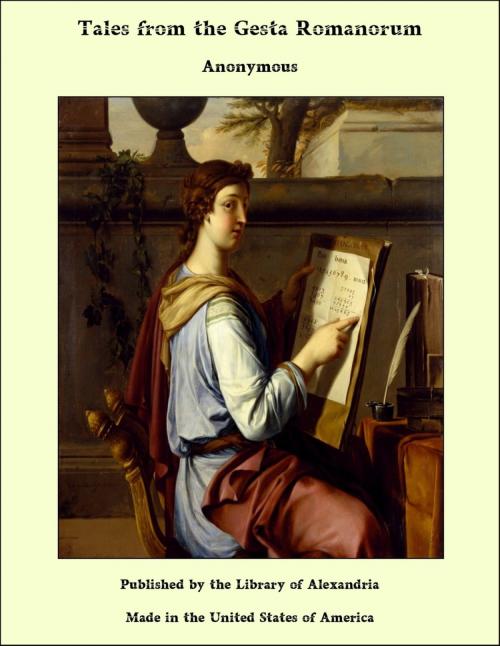Tales from the Gesta Romanorum
Nonfiction, Religion & Spirituality, New Age, History, Fiction & Literature| Author: | Anonymous | ISBN: | 9781465624918 |
| Publisher: | Library of Alexandria | Publication: | March 8, 2015 |
| Imprint: | Language: | English |
| Author: | Anonymous |
| ISBN: | 9781465624918 |
| Publisher: | Library of Alexandria |
| Publication: | March 8, 2015 |
| Imprint: | |
| Language: | English |
It was a dull, cold Christmas evening; the snow fell fast and small, and the cutting northeast wind blew its white shower into heaps and ridges in every corner of St. John’s quadrangle, and piled its clear flakes against every projecting part of the old building. No one was moving in college, at least out-of-doors; but the rude laugh from the buttery, and the dull-red gleam through the closely drawn curtains of one of the upper rooms in the outer quadrangle, proved that in two portions of the college Christmas was being kept with plenty and with gayety. The change from the white cold of the quadrangle to the ruddy blaze of that upper room was inspiriting. The fire burnt bright; the small table, drawn immediately in front of its merry blaze, glittered with after-dinner good cheer; and three young and happy faces sat by that little table, and compared their former Christmases at home, with this one, during which they were determined to remain up in Oxford and read for the ensuing examination. “Morrison is always in good luck,” said Henry Herbert, the youngest of the party. “Whatever it is, whether drawing lots for a Newham party, or cramming for an examination, he always succeeds; and now he is the last man that got away from Oxford before the roads were blocked up by this snow-drift.” “Fortunate fellow!” said Lathom. “We are shut up now—fifteen feet of snow at Dorchester, and Stokenchurch bottom quite impassable.” “Ay, and Oxford streets equally so,” said Frederick Thompson, the last of the triumvirate, “and we shut up here with the pleasant prospect of taking our constitutional, for some days to come, under the old Archbishop’s cloisters.” “By the by,” said Herbert, “what were you after in the old library last week, Lathom?” “Looking for a copy of the Gesta Romanorum, with the idea of reading some of its amusing stories during our after-dinner sittings.” “Any thing but those Romans: it is bad enough to have read and believed all that Livy wrote, from his Sucking Wolf to his Capitol Goose, and then to have a shrewd German prove that kings were not kings, and consuls not consuls, just when you are beginning to think that you really do know something about your Roman history.” “You will have but little of Roman history, Thompson; the title of the book but ill agrees with its contents: fables of all climes contribute their share in the formation of this singular composition. The majority of the tales are entirely unconnected with the history of Rome, though the writer, in order to, in some manner, cover this deviation from his title, has taken care to preface almost every story with the name of some emperor, who in most cases never existed, and sometimes has little to do with the incidents of the narrative.” “To whom, most learned antiquary, are we indebted for this very stout volume?” “To the imagination, knowledge, and literary labor of the monks of the middle ages. In the refectory, whilst the monks ate their meals, one, the youngest generally, of the society, read from some such collection as this, a tale at once amusing and instructive. Nor was the use of these fables confined to the refectory. The success which has always attended instruction by fables, and the popularity ever consequent on this form of teaching, led the monks to use this medium to illustrate their public discourses, as well as for their own daily relaxation.” “Few things are more certain,” said Herbert, “than that an argument, however clear,—a deduction, however logical,—operates but faintly except on trained intellects; but an apposite story at once arouses the attention, and makes a more durable impression on illiterate auditors. Knowledge in the garb of verse is soonest appreciated by an uneducated mind, and remains there far longer than in any other form. A ballad will descend from generation to generation without a fault or an interpolation.”
It was a dull, cold Christmas evening; the snow fell fast and small, and the cutting northeast wind blew its white shower into heaps and ridges in every corner of St. John’s quadrangle, and piled its clear flakes against every projecting part of the old building. No one was moving in college, at least out-of-doors; but the rude laugh from the buttery, and the dull-red gleam through the closely drawn curtains of one of the upper rooms in the outer quadrangle, proved that in two portions of the college Christmas was being kept with plenty and with gayety. The change from the white cold of the quadrangle to the ruddy blaze of that upper room was inspiriting. The fire burnt bright; the small table, drawn immediately in front of its merry blaze, glittered with after-dinner good cheer; and three young and happy faces sat by that little table, and compared their former Christmases at home, with this one, during which they were determined to remain up in Oxford and read for the ensuing examination. “Morrison is always in good luck,” said Henry Herbert, the youngest of the party. “Whatever it is, whether drawing lots for a Newham party, or cramming for an examination, he always succeeds; and now he is the last man that got away from Oxford before the roads were blocked up by this snow-drift.” “Fortunate fellow!” said Lathom. “We are shut up now—fifteen feet of snow at Dorchester, and Stokenchurch bottom quite impassable.” “Ay, and Oxford streets equally so,” said Frederick Thompson, the last of the triumvirate, “and we shut up here with the pleasant prospect of taking our constitutional, for some days to come, under the old Archbishop’s cloisters.” “By the by,” said Herbert, “what were you after in the old library last week, Lathom?” “Looking for a copy of the Gesta Romanorum, with the idea of reading some of its amusing stories during our after-dinner sittings.” “Any thing but those Romans: it is bad enough to have read and believed all that Livy wrote, from his Sucking Wolf to his Capitol Goose, and then to have a shrewd German prove that kings were not kings, and consuls not consuls, just when you are beginning to think that you really do know something about your Roman history.” “You will have but little of Roman history, Thompson; the title of the book but ill agrees with its contents: fables of all climes contribute their share in the formation of this singular composition. The majority of the tales are entirely unconnected with the history of Rome, though the writer, in order to, in some manner, cover this deviation from his title, has taken care to preface almost every story with the name of some emperor, who in most cases never existed, and sometimes has little to do with the incidents of the narrative.” “To whom, most learned antiquary, are we indebted for this very stout volume?” “To the imagination, knowledge, and literary labor of the monks of the middle ages. In the refectory, whilst the monks ate their meals, one, the youngest generally, of the society, read from some such collection as this, a tale at once amusing and instructive. Nor was the use of these fables confined to the refectory. The success which has always attended instruction by fables, and the popularity ever consequent on this form of teaching, led the monks to use this medium to illustrate their public discourses, as well as for their own daily relaxation.” “Few things are more certain,” said Herbert, “than that an argument, however clear,—a deduction, however logical,—operates but faintly except on trained intellects; but an apposite story at once arouses the attention, and makes a more durable impression on illiterate auditors. Knowledge in the garb of verse is soonest appreciated by an uneducated mind, and remains there far longer than in any other form. A ballad will descend from generation to generation without a fault or an interpolation.”















